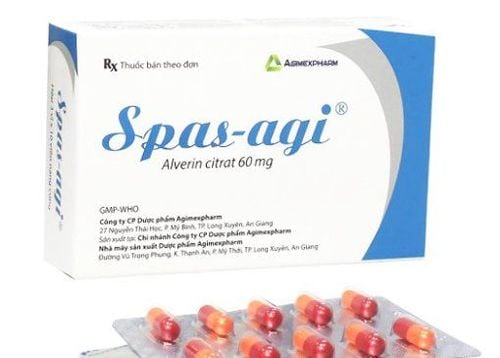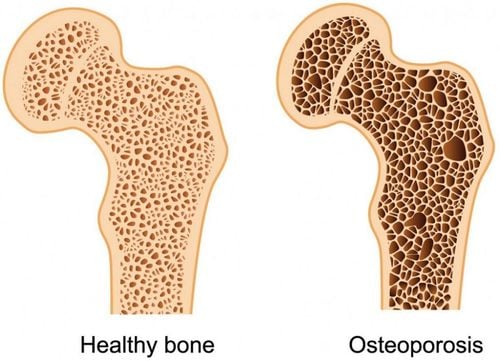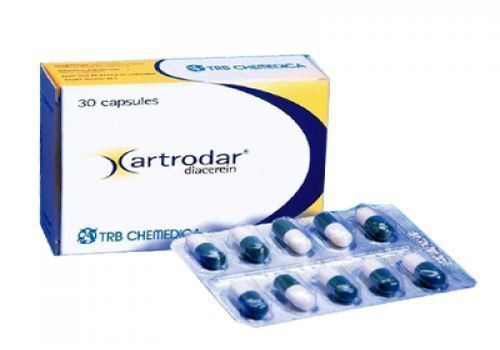This is an automatically translated article.
Propain 500mg is indicated for the treatment of rheumatoid arthritis, osteoarthritis, juvenile arthritis, acute gout, acute musculoskeletal disorders, dysmenorrhea, ... So what does Propain 500mg have? What precautions should be taken when using this drug? Let's find out the necessary information about Propain 500mg drug through the article below.
1. What is Propain 500mg?
Active ingredient: Naproxen Packaging: Box of 10 blisters x 10 tablets Prescription drug: Yes Dosage form: Tablets Uses: Treatment of symptoms in osteoarthritis, acute and chronic pain relief Subjects of use : Adults, children 5 years old Registration number: VD-20710-17 Brand: Remedica (Cyprus) Manufacturer: Remedica
2. Uses of Propain 500mg
Indications:
Long-term treatment of symptoms of chronic rheumatism, polymyalgia rheumatica, ankylosing spondylitis, pain conditions. Short-term symptomatic treatment of acute exacerbations: extra-articular rheumatism, joint damage, low back pain, severe radiculopathy. Relieves mild to moderate pain. Usage - Dosage
Follow your doctor's instructions.
Adults :
Rheumatoid Arthritis, Osteoarthritis and Rheumatoid Spondylitis : 500mg to 1g daily divided into 1 or 2 times each 12 hours apart.
Use a starting dose of 750 or 1g/day in the acute phase for the following cases:
Patients with severe pain at night or morning stiffness. The patient switched to Propain after taking another anti-arthritis drug in high doses. Patients with osteoarthritis have obvious pain symptoms. Acute gout: 750mg for the first time, then 250mg every 8 hours until the acute gout attack is over.
Acute musculoskeletal disorders and dysmenorrhea: 500mg for the first time, then 250mg at an appropriate dose range from 6h to 8h, the maximum dose for each day after the first day of treatment is 1250mg.
Children (over 5 years old): Juvenile arthritis: 10mg/kg/day divided into 2 doses 12 hours apart.
Elderly: The lowest effective dose should be used.
Overdose, missed dose and treatment
If you take a larger dose than usual, stop taking it and tell your doctor right away.
Symptoms: Lethargy, heartburn, indigestion, nausea, vomiting. A small number of patients have had epileptic symptoms, but it has not been established whether this is related to naporoxen.
Management: Empty the stomach and use supportive measures. Using activated charcoal will be effective.
Hemodialysis can be used for patients with renal failure who have overdosed on Naproxen.
Missed dose:
If you have to take a pill continuously and forget 1 time, make up for that dose as soon as possible. However, when it is almost time for your next dose, skip the missed dose and continue with your regular schedule. Consult your doctor if you forget more than 1 time.
3. Note when using Propain 500mg
Contraindication
Propain is contraindicated in patients with known hypersensitivity to naproxen or the sodium salt of naproxen, patients with a history of gastrointestinal bleeding or perforation related to NSAID therapy, patients with or with a history of ulcers, recurrent gastric bleeding (at least 2 ulcers or bleeding) and patients with severe heart failure.
Propain should not be used in patients with increased allergic symptoms such as asthma, rhinitis, urticaria when taking Aspirin and other NSAIDs.
Note
Avoid combining Propain with other NSAIDs, including selective COX2 inhibitors. Undesirable effects can be minimized by using the smallest effective dose for the shortest period of time needed to control symptoms. Patients on long-term NSAIDs should be monitored regularly to monitor for adverse events. Elderly: The elderly have a higher frequency of adverse reactions to NSAIDs, especially patients with gastrointestinal bleeding or perforation, which can be fatal. Gastrointestinal effects: Gastrointestinal bleeding, ulceration, and perforation are potentially fatal symptoms that have been reported with all NSAIDs, regardless of duration of use, in the disease. patients with or without warning signs of stomach and intestinal disease. The risk of these symptoms is increased with high doses, in patients with a history of ulcers, especially in the elderly. For these patients, treatment should be started with the lowest possible dose. Concomitant use of protective agents (misoprostol or proton pump inhibitors) should be considered in these patients and also in patients receiving concomitant low-dose aspirin or drugs that increase the risk of peptic ulcer disease. Patients with a history of gastrointestinal disease, especially the elderly, should report all unusual abdominal symptoms (especially gastrointestinal bleeding) during the initial phase of treatment. Advise patients to be cautious when using concomitantly with substances that increase the risk of ulcers, gastric bleeding such as oral corticosteroids, anticoagulants (warfarin ...), selective serotonin reuptake inhibitors, anticoagulants. platelet aggregation (aspirin...). Discontinue use of Propain when the patient has signs of ulceration or gastrointestinal bleeding. NSAIDs should be used with caution in patients with a history of gastrointestinal disease (colitis, Crohn's disease) because of the increased risk of undesirable effects. Bronchospasm may occur in patients with existing or history of bronchial asthma and allergic diseases. Cardiovascular effects: Drugs such as Propain may slightly increase the risk of cardiovascular disease (myocardial infarction, cerebrovascular disease). This is more likely to happen when high doses are used for a long time. Do not exceed the recommended dose and duration of treatment. Talk to your doctor or pharmacist if you have heart abnormalities, a history of cerebrovascular disease, or a high cardiovascular risk (eg, high blood pressure, diabetes, high cholesterol, smoking). ). Caution should be exercised when using NSAIDs in patients with high blood pressure and/or heart failure, fluid retention, and edema. Skin Effects : Serious skin reactions, some of which can be fatal, including exfoliative dermatitis, Stevens-Johnson syndrome, and epidermal necrolysis, have been reported very rarely with the use of NSAIDs. Patients are at greatest risk for these reactions at the beginning of the treatment period. Most appear within the first month of treatment. Discontinue use of Propain immediately upon appearance of skin rash, mucosal lesions or any other hypersensitivity reaction. Use in patients with renal impairment: Use with caution in patients with renal impairment and serum creatinine concentration or creatinine clearance should be monitored. Some patients, especially those with reduced renal blood flow, the elderly with impaired renal function, and patients taking diuretics, should have their renal function checked before and during treatment. Propain and consider reducing the daily dose. Use in patients with hepatic impairment: It is best to use the lowest effective dose. Effects on blood: Patients with coagulopathy or taking medications that affect blood clotting should be carefully monitored. Anaphylactic Reactions: Hypersensitivity reactions, sometimes fatal, may occur in hypersensitivity patients. Effects on vision: There have been a few cases of visual disturbances (papillary inflammation, posterior optic neuritis, papilledema) when using NSAIDs including Naproxen. Therefore, it is recommended to check the vision for patients who show signs of visual disturbance during treatment. This product contains lactose, so tell your doctor right away before taking it if you know you have an intolerance to certain sugars. Caution
Driving:
Some patients may experience drowsiness, dizziness, dizziness, insomnia, depression when taking Naproxen. If the above symptoms are present, caution should be exercised when doing tasks that require alertness.
Pregnant women:
Like other drugs, Naproxen affects the circulatory system of the human fetus (affects closure of the aortic duct). Use in pregnant women, even at the lowest level, must be carefully weighed between the benefits and risks, especially during the first and third trimesters of pregnancy.
Consult your doctor or pharmacist before using any medicine.
Lactating women:
Avoid using Propain in lactating women. Consult your doctor or pharmacist before using any medicine.
4. Side effects of Propain 500mg
Like all medicines, Propain can cause some unwanted effects.
On the gastrointestinal tract: Most of the undesirable effects are on the gastrointestinal tract. Gastrointestinal ulceration, bleeding, and perforation may occur, sometimes leading to death, especially in the elderly. Nausea, vomiting, diarrhea, flatulence, constipation, dyspepsia, abdominal pain, melena, hematemesis, stomatitis, progressive colitis, Crohn's disease and, rarely, gastritis have been reported. record.
Cardiovascular: Drugs such as Propain may be associated with a slightly increased risk of cardiovascular disease (myocardial infarction), cerebrovascular disease. Edema, hypertension, and heart failure have been reported in some patients using NSAIDs.
Skin reactions: Skin rash, urticaria, angioedema, alopecia, erythema multiforme, Stevens Johnson syndrome, epidermal necrolysis, photosensitivity reactions (including porphyria). skin manifestations, “pseudoporphyria”), exfoliation.
On the kidneys: glomerulonephritis, interstitial nephritis, nephrotic syndrome, hematuria, renal papillary necrosis, renal failure.
On the central nervous system: Convulsions, headaches, insomnia, inability to concentrate, cognitive disorders.
Blood (rare): Thrombocytopenia, agranulocytosis including agranulocytosis, hemolytic anemia, aplastic anemia.
Other effects: Tinnitus, hearing loss, dizziness, mild peripheral edema, anaphylactic reactions have been reported. Rarer are jaundice, hepatitis, visual disturbances, eosinophilic pneumonia, vasculitis, hyperkalemia, aseptic meningitis, and oral ulcers.
If you experience any of the side effects listed above, tell your doctor right away.
5. Drug interactions
Some drugs interact with Naproxen and should not be taken together.
However, a few of them can be used with special precautions. In this case, the doctor can adjust the dose or take some necessary precautions. If you are using Propain, tell your doctor or pharmacist what medicines you are taking, especially the following:
Corticosteroids, anticoagulants (warfarin), sulphonylureas, antiplatelet agents, medicines Selective serotonin reuptake inhibitors (SSRIs), furosemide, propranolol, beta-channel blockers, probenecid, methotrexate, cardiac glycosides, cyclosporine, mifepristone, quinolones, angiotensin-converting enzyme inhibitors. Antacids or cholestyramine as well as food can slow the absorption of naproxen. The use of naproxen may be temporarily stopped 48 hours before the adrenal function test because it may affect the results.
Please dial HOTLINE for more information or register for an appointment HERE. Download MyVinmec app to make appointments faster and to manage your bookings easily.













